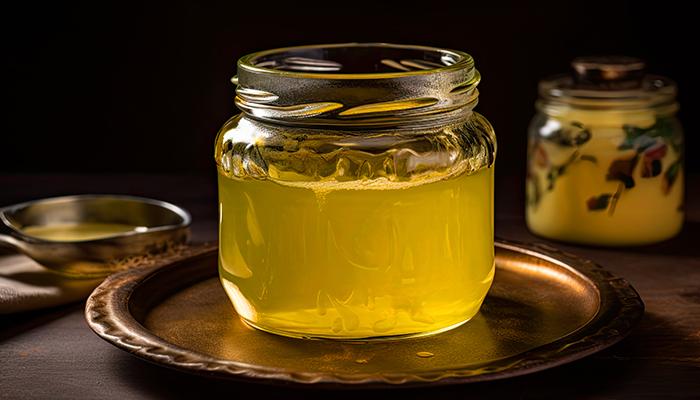Ghee has been a staple in Indian kitchens for centuries. It is more than just a cooking ingredient - it is a powerhouse of nutrition and health benefits. Modern research has confirmed what Ayurveda has known for ages: ghee is a superfood.
In this blog, we will explore the nutritional benefits of ghee, why is it considered a superfood, and how it contributes to overall well-being.
What is Desi Ghee?
Ghee is a form of clarified butter made by slowly heating butter to remove milk solids, leaving behind pure golden fat. This process enhances its shelf life and gives it a rich, nutty flavour. Unlike regular butter, ghee does not contain lactose or casein, making it easier to digest for people with dairy sensitivities.
Ghee is widely used in South Asian and Middle Eastern cuisines, not just for its flavour but also for its health-promoting properties. It has been an essential part of Ayurvedic medicine for thousands of years, and today, it is gaining recognition in the Western world as a healthy fat alternative.
Why Ghee is a Superfood?

Ghee is considered a superfood because of its various health benefits. It is packed with essential nutrients, promotes digestion, strengthens the immune system, and provides sustained energy. Unlike refined oils, ghee is a source of healthy fats that support heart health and overall wellness.
Nutritional Profile of Desi Ghee

Ghee is composed almost entirely of fat, with a significant amount of saturated fats, monounsaturated fats, and polyunsaturated fats. It also contains vital fat-soluble vitamins and beneficial compounds such as:
- Omega-3 fatty acids – Essential for heart and brain health
- Butyric acid – Supports gut health and anti-inflammatory processes
- Conjugated Linoleic Acid (CLA) – Aids in weight management and muscle building
- Antioxidants – Help neutralize free radicals and reduce oxidative stress
Health Benefits of Ghee

Some of the health benefits that ghee provides include:
One of the most well-known benefits of ghee is its positive effect on digestion. Ghee contains butyric acid, a short-chain fatty acid that helps nourish the gut lining and improve digestion. It also stimulates the secretion of digestive enzymes, making food easier to break down and absorb.
Regular consumption of ghee can help alleviate constipation, bloating, and acidity. Ayurveda recommends consuming ghee with warm water or herbal teas to detoxify the digestive tract and promote gut health.
Ghee is rich in antioxidants, and vitamins, such as Vitamin A which helps strengthen the immune system. The healthy fats in ghee aid in the absorption of fat-soluble vitamins, enhancing overall immunity. In Ayurveda, ghee is often used in herbal formulations to boost immunity and protect against infections
Ghee’s antimicrobial and antiviral properties also help in fighting seasonal illnesses such as colds, flu, and respiratory issues.
Ghee is a rich source of essential vitamins, including:
- Vitamin A (supports vision and immunity)
- Vitamin D (strengthens bones and improves mood)
- Vitamin E (promotes healthy skin and acts as an antioxidant)
- Vitamin K (helps in blood clotting and bone health)
-
Healthy Fats in Ghee
Unlike unhealthy trans fats found in processed foods, the healthy fats in ghee provide sustained energy and help balance cholesterol levels. Ghee contains monounsaturated and saturated fats, which are essential for brain function, hormone production, and cell health.
Benefits of Ghee for Weight Management
Although ghee is high in fat, it can help in weight management when consumed in moderation. The conjugated linoleic acid (CLA) has been linked to fat loss and improved metabolism. It also keeps you full for longer, reducing unhealthy cravings.
Replacing refined oils and unhealthy fats with ghee in your diet can contribute to a healthy weight loss regimen when combined with a balanced diet and exercise.
Ghee has anti-inflammatory properties that can help in relieving joint pain and stiffness. The omega-3 fatty acids in ghee lubricate joints, making movement easier. It is often recommended for people suffering from arthritis or joint discomfort.
Ayurvedic practitioners often use ghee-based herbal preparations to support joint flexibility and reduce inflammation.
Contrary to the myth that ghee is bad for the heart, studies show that ghee, when consumed in moderation, can support heart health. The healthy fats in ghee help balance cholesterol levels by increasing good HDL cholesterol while reducing LDL cholesterol.
Ghee has long been used as a natural moisturizer for glowing skin. The vitamins and fatty acids in ghee help keep the skin hydrated, reduce wrinkles, and improve skin elasticity. Applying ghee topically or consuming it regularly can give you radiant skin.
Ghee can also be used as a natural remedy for dry lips, dark circles, and skin irritations.
Ayurvedic Benefits of Ghee
In Ayurveda, ghee is considered a powerful healing food. It is used in medicinal formulations, detox treatments, and even spiritual practices. Some Ayurvedic benefits of ghee include:
- Balancing body doshas (Vata, Pitta, and Kapha)
- Enhancing memory and brain function
- Detoxifying the body
- Nourishing reproductive health
Ghee for Cooking and Nutrition
Ghee is one of the best cooking oils due to its high smoke point (around 485°F or 250°C), making it ideal for frying, roasting, and sauteing. Unlike vegetable oils that oxidize at high temperatures, ghee remains stable and retains its nutritional value.
Antioxidants in Ghee
Ghee contains natural antioxidants that fight free radicals in the body, reducing the risk of chronic diseases. These antioxidants help slow down ageing, support cellular repair, and support overall well-being.
Ghee as a Natural Energy Booster
Ghee is an excellent source of energy, making it a great addition to the diet of athletes, children, and elderly individuals. The medium-chain fatty acids (MCFAs) in ghee provide quick and sustained energy without spiking blood sugar levels.
How To Include Ghee in Your Diet?

Adding ghee to your diet is simple and delicious. Here are some ways to incorporate ghee into your meals.
- Use it for cooking instead of using vegetable oils or butter
- Drizzle it over rice, dal, or vegetables for extra flavour and nutrition.
- Spread it on toast or rotis for a nutritious meal and taste
- Mix warm milk with turmeric for an immunity-boosting drink
- Use it for baking to enhance the taste and texture of desserts
How Much Ghee Should You Consume?

While ghee is packed with health benefits, moderation is key. The ideal amount depends on individual dietary needs and lifestyle. Generally, 1-2 teaspoons per day is sufficient for most people. If you have specific health concerns, consult a nutritionist or doctor before making changes to your diet.
Conclusion
Ghee is truly a superfood that offers numerous health benefits. From better digestion and improved immunity to glowing skin and strong joints, ghee is a must-have in a healthy diet. When consumed in the right amounts, ghee can be a valuable addition to a balanced and nutritious lifestyle. So, go ahead and enjoy the goodness of ghee for cooking and nutrition, and experience its many benefits firsthand!

Is ghee suitable for lactose-intolerant people?
Yes, ghee is free from lactose and casein, making it a good choice for lactose-intolerant individuals.
Can ghee help with weight loss?
Yes, when consumed in moderation, the healthy fats in ghee can aid in weight management and metabolism.
Does ghee raise cholesterol levels?
Ghee can help balance cholesterol levels by increasing good HDL cholesterol and reducing bad LDL cholesterol when consumed in moderation.
Can I use ghee for skincare?
Yes, ghee is an excellent natural moisturizer that hydrates the skin and reduces wrinkles.
What is the best way to store ghee?
Ghee should be stored in an airtight container in a cool, dark place. It does not need refrigeration and can last for months.


